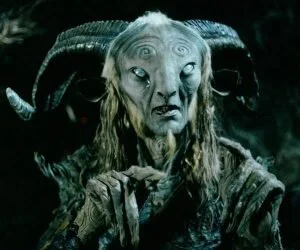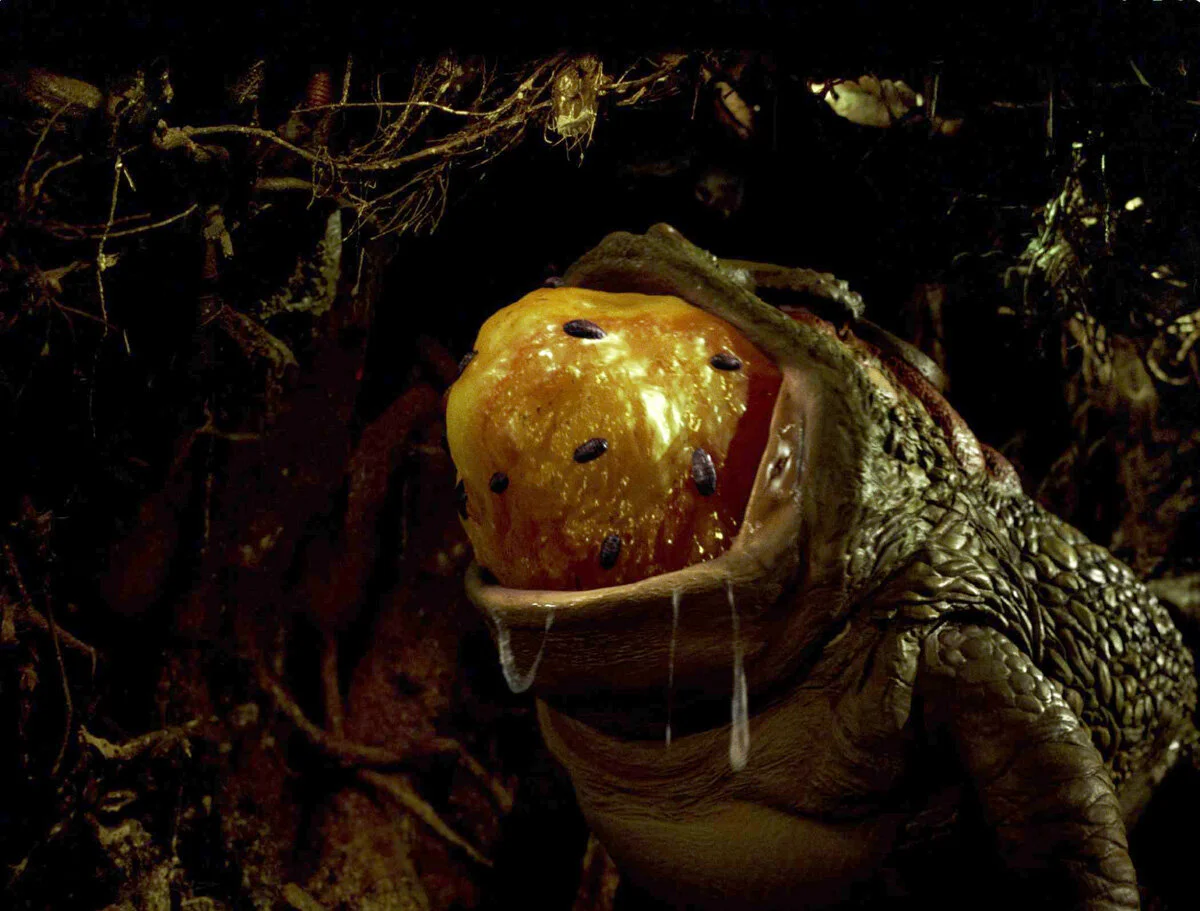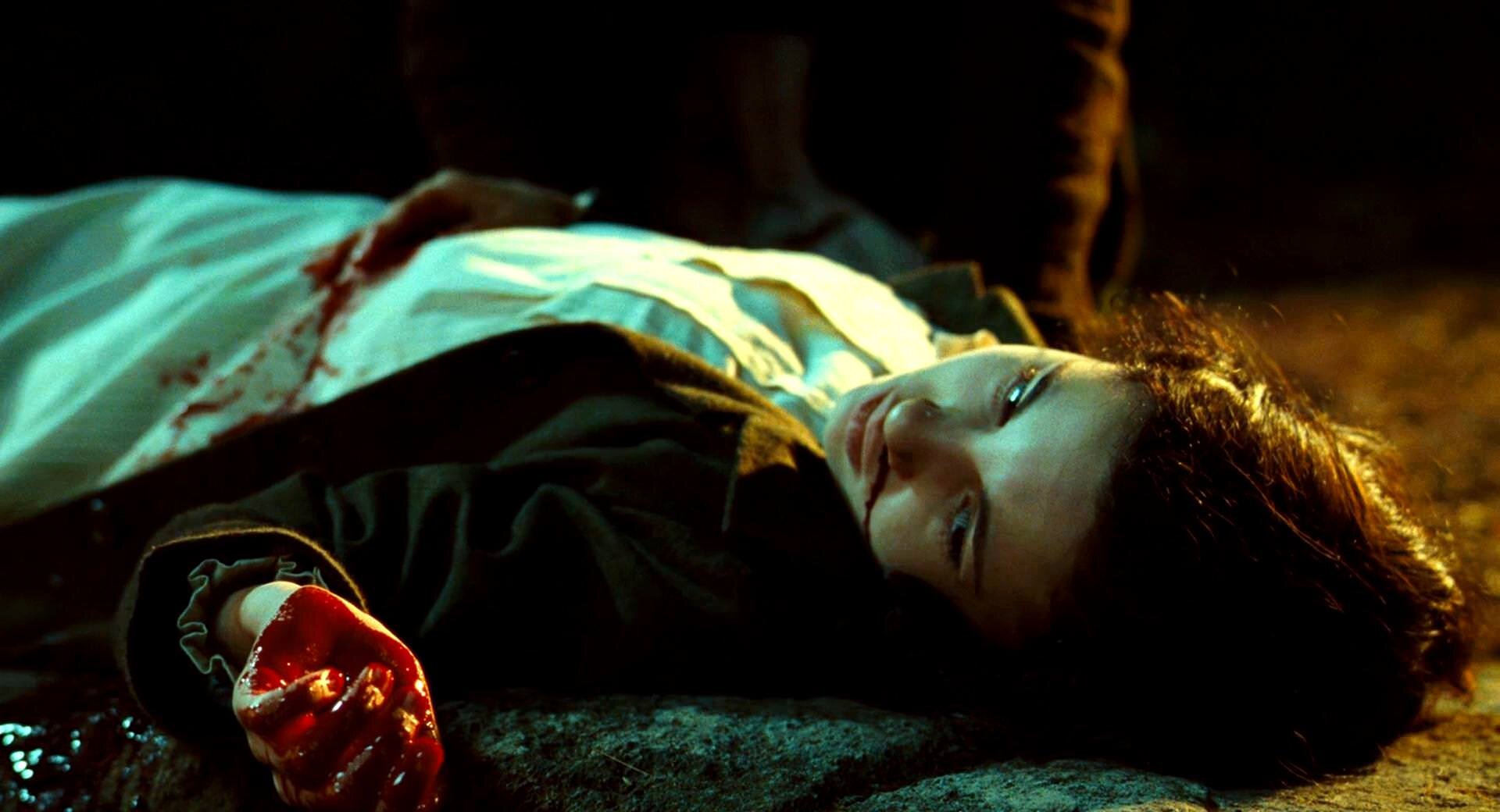Pan's Labyrinth: The Trials of Ofelia
BEWARE SPOILERS
We go into every post assuming you’ve already watched the film being discussed.
Pan’s Labyrinth (2006) is available on Netflix as of this writing (5/23/2021).
The first time we brought up the horror fairytale Pan’s Labyrinth (2006) was in our Pagan horror month wrap-up, which we decided should really just be a folk horror wrap-up. In that post, we threw up some plot summary and said, “Pan’s Labyrinth offers a rich, imaginative childhood dreamscape, whimsically layered with brutal reality.”
To be clear, we’re not saying the fantasy stuff in the film is a dream. Other people might say that, but not us. We take the faun and the Pale Man to be just as real as Ofelia’s mother and Captain Vidal--which lines up with how director Guillermo del Toro sees it. But there’s a difference between dream and dreamscape, at least how we mean it.
See, in a story dealing with dreams, you have reality and you have the dreamworld, and sometimes they overlap a la Freddy Krueger and in films like A Scanner Darkly (2006). But even in those cases, dream and reality are supposed to remain separate. Freddy is a terrifying villain and Phillip K Dick’s worlds are so unsettling because they cross that boundary.
On the other hand, in a dreamscape, sure, you might be dealing with dreams, but it’s just as likely you’re dealing with reality. For the sake of definitions, because we love us a good definition, by “dreamscape,” we mean a story full of surreal images, in which time and space bend to the narrative.
David Lynch stuff usually fits this category. From Eraserhead (1977) to Twin Peaks (1990) to Mulholland Drive (2001), the difference between reality and dream doesn’t matter--it’s all real, normal, silly, dreamy, nightmarish.
So, if you disagree and think the fantastical parts of Pan’s Labyrinth are the product of Ofelia’s daydreamy coping mechanism, that’s fine. Doesn’t matter. Either way, it’s a story about a young girl’s coming-of-age in the dual horrors of early Francoist Spain and the Ultimate Abusive Stepdad.
We’re interested in the virtues she demonstrates and the lessons she learns in her dreamscape bildungsroman. (That’s your $20 fancy academic word for this article; it means coming-of-age story.)
In the end, Ofelia grows--she transcends--not by giving up childish fantasy but by holding to her convictions, keeping her own counsel, and making moral choices, even when it means sacrificing herself.
The Trials of Ofelia
1944, five years after the Spanish Civil War, Ofelia (Ivana Baquero) travels with her pregnant mother Carmen (Ariadna Gil) to live with her new stepfather, the ruthless caricature of toxic masculinity Captain Vidal (Sergi López).
While exploring the grounds of the old-mill-turned-military-site, she discovers an ancient labyrinth and, within it, a faun (Doug Jones; voiced by Pablo Adán) who believes she carries the soul of Moanna, the Underworld princess who came to the mortal world, where the sun’s “brightness blinded her and erased her memory. … Her body suffered cold, sickness, and pain. Eventually, she died.”
The faun says she can reclaim her throne if she completes three tasks to prove her essence is untainted by her mortal lives. Ofelia’s quest begins amid her mother’s imperilled pregnancy and Captain Vidal’s reign of terror.
The Toad
Ofelia’s first task is to retrieve a key from the belly of a massive toad, which coincides with Vidal’s dinner party. As such, Ofelia is expected to wear a beautiful green dress her mother has made--one that quietly recalls Alice’s dress in Disney’s Alice in Wonderland (1951).
The slight nod builds connective tissue with another dreamscape fantasy in which a girl is told to put aside “childish notions.” The dress represents how her mother and Vidal want Ofelia to look--refined, mature, and worthy of being seen as the Captain’s daughter. Once she dons the dress, others remark how pretty she looks and warn her not to get it dirty.
Before setting off for the toad, Ofelia confides in Mercedes (Maribel Verdú) and asks whether she believes in fairies, to which the housekeeper replies, “No. But when I was little, I did. I believed in a lot of things I don’t believe anymore.” Mercedes’ answer contrasts with Carmen’s and Vidal’s demand that Ofelia put aside childish fantasies. Instead, Mercedes offers soft reassurance, even if she doesn’t believe in fairies, she doesn’t shame Ofelia. This statement also rings of faltered idealism under Franco’s dictatorship. That honesty earns Ofelia’s trust. She shares what happened the night before, and Mercedes listens, validating Ofelia’s experiences, even if she thinks they’re fantasies.
Ofelia’s and Mercedes’ conflicts mirror each other, as both believe in an ideal threatened by the same authority: Captain Vidal. They must perform complacent roles for the Captain, as daughter and housekeeper, forced to hide themselves and act in secret.
Reading from the Book of Crossroads, Ofelia narrates the story of the toad:
… [W]hen the forest was young, it was home to creatures who were full of magic and wonder. They protected one another and slept in the shade of a colossal fig tree that grew on a hill, near the mill. But now the tree is dying. Its branches are dry, its trunk is old and twisted. A monstrous toad has settled in its roots and won’t let the tree thrive.
True to the book, the tree is gnarled, and the surrounding land has become a squalid muck. Her shoes already caked in mud, Ofelia carefully removes the dress, arranging it on a branch to keep it clean so she can continue without destroying her mother’s hard work.
As with the dress itself, she does her best to balance her opposing responsibilities, but ultimately, she makes her choice when she descends into the cavernous tree.
Her crawl through the tree is interspersed with scenes of Vidal tightening his grip on the land. He and his men pursue a rebel camp after noticing a trail of smoke in the surrounding forest. By the time they arrive, the rebels have fled, but they’ve left supplies, including a vial of stolen antibiotics.
Vidal yells, “You left this behind! And your lottery ticket! Why don’t you come back to get it? Who knows? This could be your lucky day!” He seems disappointed when the rebels refuse to engage.
Meanwhile, as Ofelia pleads with the toad to give up the land, the creature belches over her. She urges him to change, to recognize the harm he’s wrought, but the toad, like Vidal, is unmoved, consumed by mortal dominion.
Ofelia must get the toad to eat three magic stones and “take the golden key from inside its belly. Only then will the fig tree flourish again.” She tempts the toad with a rolled up pillbug. He snatches the bug from Ofelia’s hand, but in his greed and gluttony, eats the stones too. His rotting, putrid, yellow insides erupt from his body, leaving a deflated sack of skin. Atop his gelatinous former innards rests the golden key.
Ofelia emerges from the tree covered in mud and slime, victorious but exhausted. This first challenge was harder and more traumatizing than she’d imagined. Her victory is further stained when she discovers her dress dislodged from the branches, muddied, and ruined.
Her first step back to life as Princess Moanna comes with the price of missing dinner, destroying the handmade dress, and the shame of disappointing her mother. But in the process, she has discovered strength, resilience, and wit, and she’s learned, monsters cannot be reasoned with.
The Pale Man
For her second task, Ofelia must overcome impulse and desire. She fails, but manages to escape horrific consequences by her bravery and ingenuity.
In the build-up to the film’s most famous scene, we get a parallel scene in the “real” world. Vidal and a group of men and their wives, all instrumental or complicit in Francoist oppression, discuss severely cutting families’ rations while they indulge in a gluttonous feast. To justify their greed, a Catholic priest proclaims,
God has already saved their souls. What happens to their bodies, well, it hardly matters to Him.
His cynical use of religion to justify evil deeds reflects the Church’s complicity in the Franco regime and the wickedness of the mortal world--the reality for which Ofelia is told to give up her fantasies.
In a nightmarish caricature of this dinner, having received magical chalk from the faun to draw a door in her bedroom, Ofelia enters the Pale Man’s banquet hall. The camera scans past a pile of small shoes in the background, those of the Pale Man’s child victims. Images celebrating their torment and murder at his hands adorn the walls.
Ofelia wanders the banquet hall, impressed by its wonder, inattentive to the monster at the head of the table, the same seat held by Vidal at the dinner. The faun has told her to retrieve a sacred dagger from one of three cabinets and to eat “Absolutely nothing!” The fairies, who the faun said would guide her, try to persuade her to open the center cabinet, but Ofelia intuitively chooses the left cabinet instead and finds the dagger.
But as quickly as her self-confidence and disobedience pay off, they also lead her to ignore the fairies’ warning, again, to eat nothing as she pops two grapes in her mouth. The scene climaxes as Doug Jones’ viscerally grotesque Pale Man awakens.
Taking his disembodied eyes from a plate, he inserts them not in his head, but inside the palms of his hands, which he splays out before his face where his eyes should be. Then he snatches and devours two fairies and begins staggering after Ofelia, who barely escapes with her life, the dagger, and one surviving fairy.
After the Pale Man, we’re presented with more parallels: first, Mercedes’ and Dr. Ferreiro’s (Álex Angulo) stealing of supplies and medicines, like Ofelia’s theft from the Pale Man; then the rebels’ assault on Vidal’s base as they steal weapons and supplies; and finally, Captain Vidal’s discovery of the stolen storage key. Like the Pale Man’s awakening, on finding the key, Vidal begins to see the rebel collaborators right in front of him. And, just as the Pale Man eats two of the fairies, Vidal kills one of the rebels himself, before capturing and torturing another.
Despite the tragedies that result from the rebels’ assault, their success is instrumental in the final defeat of Vidal, just as Ofelia’s partial triumph over the Pale Man is instrumental in her return to the Underworld. Both are tainted victories, and the faun is outraged at Ofelia’s disobedience, her giving into mortal temptation.
But her trials are not about perfection; they’re about goodness, wisdom, and transcendence beyond the wicked mortal world. Ofelia is mortified at the horror she’s caused. But the same penchant for disobedience that allowed her to eat the grapes also led her to the correct cabinet. All virtues that might save us, it would seem, come with vices that might destroy us.
The Anti-Abrahamic Sacrifice
The final test demands sacrifice, and Ofelia must overcome the voice of authority as it tells her to commit a terrible act.
Abandoned by the faun for her disobedience, the world around her unravels. The mandrake root under her mother’s bed stops moving, and when Vidal discovers it, he rages over Ofelia’s absurd fantasies.
Carmen stops him when he moves to strike Ofelia, but then she belittles her daughter for believing in magic before throwing the smashed mandrake into the fire. Carmen rejects Ofelia’s supposed fantasy in favor of her own, one that, unlike Ofelia’s, ignores the terrible reality in which she’s placed them. In doing so, she’s marked herself for death. Carmen collapses, clutching her pregnant belly in agony.
Even before this, Carmen chose to bring her daughter to Vidal’s military home, to place both of them under the care of a Captain among fascists, and to insist Ofelia put away childish stories. She’s trying to give her daughter a better life, but it’s only better in her own fantasy. The reality is stifling, harsh, and rigid. It requires that they accept and support a violent man and, by extension, the brutal regime he serves.
Carmen still might have survived her labor, except for what happens next. Dr. Ferreiro delivers a lethal injection to a prisoner the Captain had wanted to continue torturing. Knowing this act of mercy will get him killed, Ferreiro sacrifices himself for a moral good. Vidal can’t understand why the doctor wouldn’t just obey. “It would have been better for you.” Ferreiro replies:
To obey--just like that--for the sake of obeying, without questioning … that’s something only people like you can do, Captain.
The risks of defying authority are again laid bare in Ferreiro’s death. Vidal knowingly sacrifices his wife in a fit of rage over Ferreiro’s disobedience. The paramedic who takes the doctor’s place lacks the skill needed to save her. But, as Vidal had already told Ferreiro, “If you have to choose, save the baby.”
After Carmen’s funeral, Vidal threatens Mercedes, revealing that he knows she’s a spy. She tries to flee with Ofelia, but they don’t get far. Vidal locks the girl in the attic while his men tie Mercedes up in the barn.
In another act of defiance, Mercedes cuts the rope from her wrists and attacks Vidal, who’s come to torture her. “You won’t be the first pig I’ve gutted,” she says before slashing his cheek (in the style of Heath Ledger’s Joker), physically reflecting his internal monstrosity.
Mercedes escapes and gets caught again, but the rebels come to her rescue. Although she’s reunited with her brother Pedro (Roger Casamajor), she must leave Ofelia behind for now.
Ofelia, still locked away, is visited once more by the faun. “I’ve decided to give you one last chance,” he says before demanding fealty: “You promise to listen, to do everything I tell you? Without question?”
Ofelia nods, wide-eyed, hopeful, desperate. She follows his orders to bring her brother to the labyrinth, stealing him from Vidal’s study, with the Captain chasing her in a rage of pain from his throbbing face.
The faun, having hidden her away for a moment, tells her she must shed the blood of an innocent to open the portal: “A pinprick, that’s all. Just a drop of blood. It’s the last task! Hurry!”
When Ofelia refuses to harm her brother, the faun shouts at her, astonished that she would sacrifice her “sacred rights for this brat.” But Ofelia holds to her convictions, even facing certain death, as the faun, in his roundabout trickster way, has taught her to do.
When Ofelia chooses to give up her claim to the throne and her mortal life to protect her brother, the faun vanishes, and Vidal finds her. He takes his son from her arms and shoots her.
This, it would seem, was the anti-Abrahamic test all along. You know the story of Abraham and Isaac, right? God’s all, “Okay, Abe, it’s about that time. I need you to kill your only son.” Abraham’s really torn up about it, but eventually he’s like, “Alright, God. I’ll sacrifice Isaac to prove I’m really scared of you.” And he’s ready to do it--got the knife raised up and everything--when God says, “JK, Abe! Here, kill this ram instead!”🐏
But the faun doesn’t say he’s kidding. Ofelia must choose what’s right.
In her final mortal moments, the veil is lifted, as the king of the Underworld tells Moanna to rise and take her rightful place as Princess. The faun appears and congratulates her on passing the test by refusing to obey without question, refusing to commit wicked acts, and sacrificing herself to protect an innocent.
Mortal Fantasies, Moral Truth
Above the Underworld, the Captain carries his son out of the labyrinth, where he’s met by Mercedes, Pedro, and a group of other rebels as the base burns. Facing his demise, the Captain turns to the story of his father and smashes his own watch on the ground so his son will know the hour he died.
Even in the Captain’s fantasy, he’s consumed by mortal concerns: his fixed understanding of time and obsession with legacy and name, which are themselves dreams of immortality. But the rebels deny him this fantasy. Mercedes tells him, “He won’t even know your name,” and Pedro fires a bullet through the Captain’s eye.
In the film’s final judgment, the Captain--so concerned with petty dominion, property, name, and legacy that he cares nothing for life, suffering, the dignity of others, or love--is stripped of all and damned to be forgotten.
But Ofelia has proven not only that she’s strong, resilient, clever, and wise, but also compassionate, kind, loving, and righteous. She’s allowed to return to the Underworld as Princess Moanna, having earned eternal life by acting according to the central Truth that the lives of others, especially the innocent, must be protected, even at the cost of her own. Moreover, she does so in defiance of the faun’s voice of authority, refusing “to obey without questioning.”
Whether the faun, the fairies, the toad, and the Pale Man were real or imagined, Ofelia’s choices show her ability to see immortal Truth and goodness beyond the cruel veil of reality and the distractions of mortal vanity. Ofelia learns and grows not by discarding her fairytales, but by seeing the moral Truths they represent. The dreamscape, the fantasy, is the path to her coming of age.















